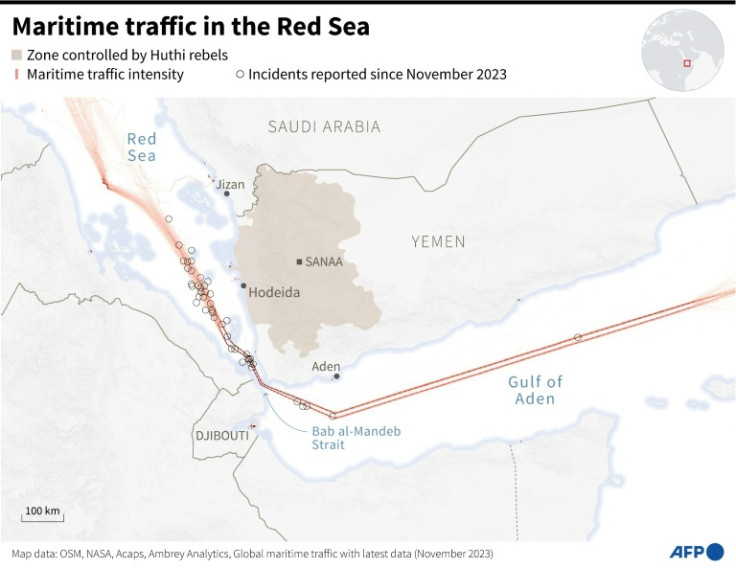US, Allies Warn Huthis As Ship Attacks Rattle Global Commerce
Twelve nations led by the United States on Wednesday jointly warned Yemen's Huthi rebels of unspecified consequences unless they immediately halt sea attacks that are increasingly disrupting global commerce.

Twelve nations led by the United States on Wednesday jointly warned Yemen's Huthi rebels of unspecified consequences unless they immediately halt sea attacks that are increasingly disrupting global commerce.
President Joe Biden's administration described the statement -- joined notably by Britain, Germany and Japan -- as a final warning as he weighs possible military strikes against the Huthis if attacks persist.
The Iranian-backed rebels, who control much of Yemen including the capital Sanaa and most of the Red Sea coast, have been firing on ships allegedly linked to Israel in avowed solidarity with Palestinians in the battered, Hamas-run Gaza Strip.
"Let our message now be clear: we call for the immediate end of these illegal attacks and release of unlawfully detained vessels and crews," said the joint statement released by the White House.
"The Huthis will bear the responsibility of the consequences should they continue to threaten lives, the global economy and free flow of commerce in the region's critical waterways."
A senior Biden administration official, while not specifying the consequences, called the message "very clear."
"I would not anticipate another warning. I think this statement speaks for itself," the official told reporters.
Biden consulted with his national security team on the morning of New Year's Day while on holiday in the US Virgin Islands to "discuss options" over the Huthi attacks, the official said.
Britain -- a close US ally on security issues -- has issued its own warning of "direct action," with Prime Minister Rishi Sunak saying that the Huthis "must end their deadly and destabilizing attacks on vessels."
"The UK will always take action to defend freedom of navigation," Sunak wrote on X, formerly known as Twitter.
The United States earlier sent an aircraft carrier to the area and announced a naval coalition to protect movement in the Red Sea, through which 15 percent of global trade passes, according to UN figures.
The UK has contributed a Royal Navy destroyer, HMS Diamond, to bolster the longstanding British presence in the Gulf area.
On Sunday, the US military said it had sunk three Huthi boats following attacks on a container ship of Danish shipping giant Maersk. The rebels said 10 of their fighters were killed in the incident.
The Huthis on Wednesday announced the latest of its more than 20 attacks, saying they attacked a Malta-flagged freighter believing it was headed for occupied Palestinian territory. The ship was not hit.
At a Security Council meeting on Monday, the UN's maritime agency said that 18 shipping companies were re-routing vessels around Africa to avoid the Red Sea due to the upsurge in attacks.
Going around Africa instead of through the Suez Canal means an additional 10 days of travel, International Maritime Organization chief Arsenio Dominguez said.
After the latest attack, French operator CMA CGM announced a big hike in prices, with a 40-foot container between Asia and the western Mediterranean doubling from $3,000 to $6,000.
Maersk on Tuesday extended a suspension of services through the Red Sea and Gulf of Aden, south of Yemen, "until further notice."
Khaled Khiari, an assistant UN secretary-general, voiced concern about global commerce and also the "risk of Yemen being dragged into a regional conflagration."
Since Tuesday, Iran has been hit by a major blast and a suspected Israeli attack killed a senior Hamas leader in Lebanon.
The Biden administration official said that the Huthi missiles -- which can travel at Mach 5, five times the speed of sound -- were "very clearly coming from Iran."
The Biden administration was initially cautious in its response as it is seeking to preserve a fragile peace in Yemen, where a decade of civil war has caused one of the world's worst humanitarian crises in the Arabian peninsula's poorest country.
A truce between the Huthis and the Saudi-backed, internationally recognized government has largely held since April 2022.
The only regional country to sign the White House-led statement was Bahrain, the tiny Gulf state that has particularly tense relations with Iran, which supports the Huthis.
The other signatories were Australia, Bahrain, Belgium, Canada, Denmark, Italy, the Netherlands and New Zealand.

© Copyright AFP 2025. All rights reserved.





















